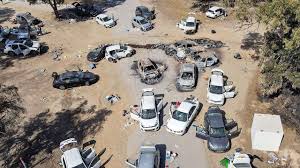Despite Israel’s stated objectives of returning the hostages and eliminating Hamas’s military capability, the outcome of the war is still unclear. However, it may now be possible to explore and understand why Hamas attacked Israel when it did and what were its main objectives.
It is generally agreed that the main reason for Hamas’s timing was its concern and fear that the normalisation agreement between Israel and Saudi Arabia was reaching a critical phase and its long term determination to destroy the Jewish state could be brought to an end by this crucial agreement between Israel and the most important Arab state in the region.
How could Hamas continue with its fundamental objective to destroy Israel when it has joined the Arab world in its confrontation with the rogue Iranian Regime? Most of the Arab states are unlikely to keep supporting Hamas or approve of its actions once a new paradigm has been established in the region. Hamas realised that it had to act in order to maintain the state of belligerence and hostility between Jews and Arabs and in order to achieve this outcome, it was critical to elicit a harsh and extreme reaction from Israel making it impossible for the world to ignore.
Another reason for Hamas’s timing was the continuing deterioration of the situation in the West Bank, where a minority of aggressive settlers frequently clashed with Palestinian villagers and Hamas wanted to be seen as the defender of these “powerless” people. Also, images of Jews praying at a site customarily reserved for Muslims and actions of Israeli police “invading” the Aqsa Mosque all contributed to the creation of the moment Hamas had to act.
It is also believed that a major part of Hamas’s objective was to capture Israeli hostages that would provide Hamas with a strong negotiating position to try to free Palestinian prisoners that have been held in Israeli jails for many years.
Hamas was also well aware of the misconception it had successfully cultivated and held by the Israeli Government that Hamas had rejected violence and instead was more interested in governing Gaza and improving the lives of its citizens. On two occasions, Hamas did not join in serious clashes initiated by Islamic Jihad against Israel. Hamas were seen to be more concerned about increasing aid into Gaza and also the number of work permits granted by Israel to allow more Gazans to work in Israel.
And so, Hamas prepared a secret plan, known only to a handful of its leaders, to attack southern Israel with the brutality, savagery and extreme violence reminiscent of ISIS. Their plans resulted in babies being slaughtered, hundreds of bodies desecrated, young people burned alive, women raped, parents executed in front of their children and children killed in front of their parents.
As expected and hoped by Hamas, the Israeli government and its citizens were shocked and traumatised by the brutality of the terrorists, leading to a response aimed at ensuring that this kind of attack could never happen again. Although Israel has consistently attempted to minimise civilian casualties, the war has nevertheless resulted in the death of many civilians and the destruction of homes across the strip, resulting in widespread sympathy and support for the Gazans from the Arab countries and the world in general.
And so as predicted, within days of the Hamas action, with the world bombarded with pictures from Gaza showing the plight of the Palestinians, the atrocities that took place on 7 October were quickly forgotten and erased from people’s minds.
But Hamas continues to show that it cares little for the people of Gaza. As the world continues to scream for a ceasefire, Hamas is saying nothing. It’s unwillingness to release the Israeli hostages, an action that would almost certainly result in a ceasefire, clearly illustrates that it would rather see more civilians killed than save them.
Moussa Abu Marzouk, a prominent member of Hamas’s political bureau, has declared that the terror group that rules Gaza is not responsible for protecting the Strip’s civilians, and said that the vast tunnel network underneath the enclave is only for the protection of Hamas terrorists.
In an interview with Russia Today’s Arabic channel, Abu Marzouk was asked why Hamas has dug hundreds of miles of tunnels in the territory it has ruled over since 2007, but has never built shelters for the Gaza civilians to hide during bombings.
“We built the tunnels because we have no other way of protecting ourselves from being killed in airstrikes. We are fighting from inside the tunnels,” the Qatar-based official said. “Seventy-five percent of the population of Gaza are refugees, and it is the UN’s responsibility to protect them.”
Several Israeli leaders, including Prime Minister Netanyahu, have stated that the war’s objectives include the destruction of Hamas, but it is generally agreed that this cannot be done by military force alone. It now appears that the war is more about ending Hamas’ governance in Gaza. What happens next to this internationally proscribed terrorist organisation is largely dependent on how the war ends. Most of Hamas’s senior leadership in Gaza is still in hiding, Israeli hostages are still being held in Gaza and some people warn that the scale of Israel’s response could lead to a new generation of terrorists.
Hamas Official Ghazi Hamad of the organisation’s political bureau said that Hamas will repeat the October 7 attack, time and again, until Israel is annihilated.
“We must teach Israel a lesson, and we will do this again and again. The “Al-Aqsa Flood”, a reference to 7 October, is just the first time, and there will be a second, a third, a fourth, because we have the determination, the resolve, and the capabilities to fight. Will we have to pay a price? Yes, and we are ready to pay it. We are called a nation of martyrs and we are proud to sacrifice martyrs.”
But Ghazi Hamad and his family do not live in Gaza.

